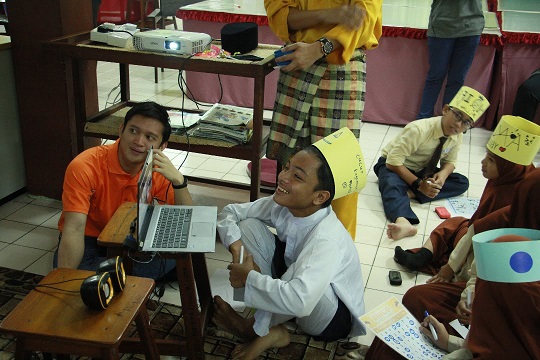Events Calendar




KOTA SAMARAHAN, 18th July 2019 : Sarawak recently introduced a Digital Economy Agenda as an initiative by the demands of the fourth industrial revolution. It is estimated that the digital economy will upsurge economic growth in Sarawak, which has been relying mostly on natural resources over the past few decades. Big data analytics will become one of the critical parts of the digital economy agenda. It will help business owners to make the right economic decisions in the future based on data gathered from customers' online activities. One of the human-resource strategies to fulfil the Sarawak Digital Agenda initiative, mathematics teachers in Sarawak, play a crucial role in the agenda. Teachers who are currently teaching in urban and rural Sarawak schools are needed to align their teaching methods that will encourage mathematical cognition among students. When teachers use Big Data concepts when they teach Mathematics, students will learn about the importance of mathematical cognition. They will learn about how important it is to master mathematical cognition. It is a type of knowledge that will be useful to approach big data analytics in the future.
Mathematical cognition is fundamental when it comes to reasoning, problem-solving and decision making. Problem-solving such as finding solutions to numerous mathematical problems improves students' cognitive ability. Logic is required in forming conclusions and making inferences from facts such as why is the method to solve this mathematical problem is done in a certain way. Lastly, making decisions involves higher order thinking skills by sorting out the pros and cons each time a decision is made.
Recently, a survey was done at Universiti Malaysia Sarawak (UNIMAS) to identify the level of awareness among local Sarawak teachers regarding the link between big data analytics and mathematical cognition. Questionnaires were distributed via social media such as email, WhatsApp and Facebook status to all Mathematics teachers who were actively teaching in urban and rural Sarawak. The survey focused on mathematical teaching strategies, which consisted of behavioural strategies, cognitive strategies and effective strategies. Behavioural strategies focus on handling students' behaviour during classroom teaching and learning. Cognitive strategies help to gauge students' cognitive ability in learning mathematics. Effective strategies guide the choice of relevant techniques to teach mathematics effectively to suit their learning competencies. Thirty-eight respondents participated in the survey; 21 of them were female teachers, and the remaining 17 were male teachers. 44.7% are teaching in Kuching, 15.8% from Kota Samarahan, 7.9% from Serian, 7.9% from Sarikei, 7.9% from Mukah, 7.9% from Limbang, 5.3% from Bintulu and 2.6% from Betong. 68.4% of them are teaching in rural schools, whereas the other 31.6% of teachers are teaching in urban schools. 50% are teaching in primary schools and the remaining 50% in secondary schools. Thirteen of the respondents have had teaching experience of more than 20 years.
Findings from the study revealed that teaching strategies used by mathematics teachers in Sarawak are not influenced by the gender of their students, types of schools, districts and years of teaching experience. The standards of teaching from each teacher throughout Sarawak is similar. Most of them are mindful of the digital economy agenda and have attempted to guide their students to see the connection between big data analytics and mathematical cognition. The opportunities and challenges faced by teachers in exposing their students with big data analytics and how it would bring impact towards the state's economic growth are necessary to be included to find the right solution to familiarize digital economy with their students.
Demographic factors have no direct influence on mathematics teachers' teaching strategies.
The relationship between big data analytics and mathematical cognition should be highlighted consistently during teaching to prepare the students in fulfilling the Digital Economy Agenda for Sarawak in the future. Mathematical skills are necessary to perform big data analytics. Numerical analysis and statistical analysis are needed to be carried out to analyze data collected and create models which can be used to predict future outcomes based on the decisions made. For instance, most business companies seek the help of data analysts to conduct big data analytics based on their customers' online behaviour and demands. Once the data is analyzed, they can fulfil needs from their consumers by supplying what they want and what they often searched online to boost their economic gain and maintain the company's performance.
The accuracy of this study can be increased if more respondents took part in the survey. More aspects can be identified that will augment the teaching strategies of mathematics teachers in raising students' awareness of big data analytics and mathematical cognition. Thus, it will prepare them for the future economic growth of Sarawak through Digital Economy.

